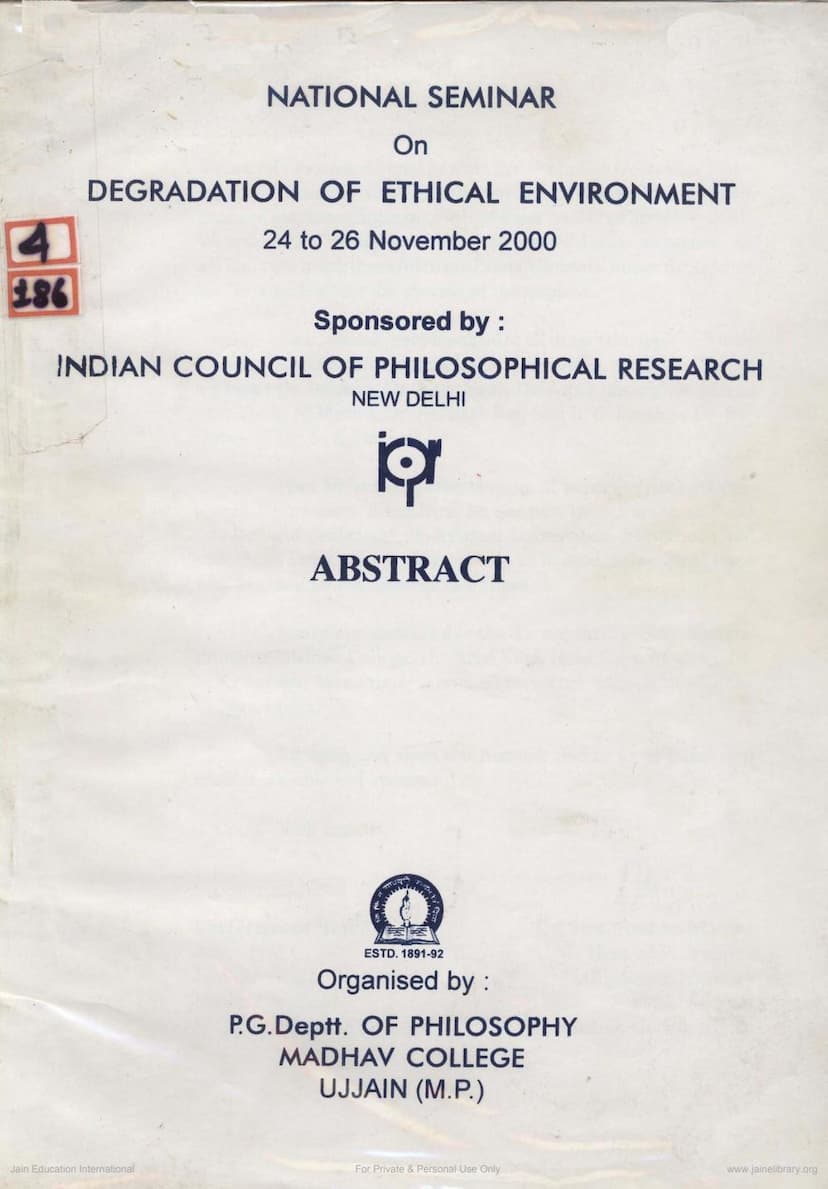Degradation Of Ethical Environment 2000 11
Added to library: September 1, 2025

Summary
The document "Degradation of Ethical Environment 2000 11" published by Madhav College Ujjain is a collection of abstracts from a National Seminar held from November 24-26, 2000. The seminar was organized by the P.G. Department of Philosophy at Madhav College, Ujjain, and sponsored by the Indian Council of Philosophical Research, New Delhi.
The overarching theme of the seminar was the degradation of the ethical environment, exploring various facets of this societal decline and potential solutions. The abstracts presented cover a wide range of perspectives and disciplines, reflecting a multi-faceted approach to understanding and addressing the issue.
Key themes and perspectives emerging from the abstracts include:
- The Nature of Moral Decline: Several papers address the ubiquity and depth of moral degradation in contemporary society across all spheres of life, including social, political, economic, and judicial. The general sentiment is that this decline is a serious threat to human society and civilization.
- Causes of Ethical Degradation:
- Modernity and Technological Advancements: The impact of science, technology, and modernization is often cited as a contributing factor, leading to a shift away from human values and moral relations.
- Materialism and Consumerism: The pursuit of material wealth and the influence of consumerist culture are identified as drivers of unethical behavior.
- Social and Economic Factors: Poverty, unemployment, population growth, and class divisions are highlighted as underlying causes of ethical decay and social breakdown.
- Family and Education: The role of family as the first school of morality and the influence of upbringing and education are emphasized. The need for improved pedagogical approaches to foster positive self-image and moral conduct in students is also discussed.
- Internal Factors: Individual factors like greed (trishna), anger (krodh), ego (ahankar), and lust (lobh) are identified as internal drivers of unethical actions.
- Philosophical and Religious Perspectives:
- Indian Philosophy and Tradition: The wisdom of ancient Indian texts like the Mahabharata and the concept of purusharthas are revisited as potential sources of guidance for a holistic vision of life. The importance of ethical traditions and the concept of Rta (cosmic order) in ancient Indian thought are also explored.
- Buddhist Ethics: The applicability of Buddhist ethics, known for its rationality and logic, to address the present ethical crisis is considered.
- Jainism: The "Anuvrat" movement, originating from Jainism, is presented as a path to moral conservation through self-discipline and spiritual understanding.
- Christianity: The principles of Christianity are referenced as a potential solution to human problems through concepts like "follow," "fellow," and "fellowship."
- Islam: The emphasis on virtuous deeds and good intentions in Islam is seen as a path to moral progress and the attainment of Divine love.
- Marxist Viewpoint: Moral pollution is analyzed through a Marxist lens, identifying alienation and the socio-economic material conditions of a class-divided society as root causes.
- Specific Ethical Dilemmas:
- Advertising Ethics: The paper discusses ethical dilemmas in advertising, including truthfulness, credibility, the promotion of materialistic demands, the misuse of women and sex appeals, social discontent, and the need for advertisers to be philosophers in developing countries.
- Medical Ethics: The importance of human sympathy and understanding in medical practice, alongside professional skill, is highlighted, emphasizing the need for ethical guidelines.
- Environmental Ethics: The relationship between human actions, ecological crises, and moral progress is examined, stressing the need for a balanced and responsible approach to nature.
- Solutions and Way Forward:
- Inward Revolution: A fundamental shift in individual consciousness and an "inward revolution" are proposed as the key to societal transformation.
- Education and Pedagogy: Reforming educational systems and teaching methods to foster moral development and positive self-image in students is crucial.
- Integral Perspective: Understanding value systems and societal problems from an integral and holistic viewpoint is essential for finding truth.
- Spiritual Values: The need for a "super-system of spiritual values" like truth, beauty, goodness, and bliss is emphasized for creative orientation.
- Professional Ethics: The importance of integrity, objectivity, and confidentiality in professional conduct is highlighted, with an illustration from the Mahabharata.
- Balance and Harmony: The concept of balance – between materialism and spirituality, economics and ecology, and individual and societal needs – is seen as vital.
In essence, the seminar aimed to foster a critical discussion on the declining ethical standards in society, explore its multifaceted causes, and identify potential remedies through philosophical, religious, social, and educational frameworks. The collected abstracts provide a snapshot of the academic discourse on this critical issue at the turn of the millennium.